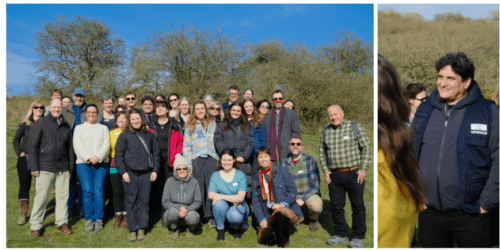Three-star chef Mauro Colagreco, UNESCO Goodwill Ambassador for Biodiversity, visited Brighton & Hove Biosphere – The Living Coast, the UK’s only urban biosphere reserve, on 26 and 27 March. The meeting, organised in conjunction with the national meeting of the UK’s 7 reserves, highlighted the initiatives of communities, often volunteers, working to conserve living things. Two days dedicated to nature, food and education, part of the environmental awareness mission of the leader in circular gastronomy, also supported by immersive culinary experiences at his recently Michelin-starred London restaurant, Mauro Colagreco at Raffles at The OWO.
A commitment to biodiversity and education
Aware of the fundamental role played by these little-known areas – true living laboratories for sustainable development – that are biosphere reserves, Mauro Colagreco is engaged in raising awareness of their existence and the importance of preserving them.
A biosphere reserve is an area designated by UNESCO to reconcile biodiversity conservation and sustainable development. It serves as an experimental area where the interactions between the environment and human activities are studied in order to develop balanced management models. These areas include terrestrial, marine and coastal ecosystems and play an essential role in finding solutions to global environmental challenges.
Chef Colagreco’s participation in the National Meeting of UNESCO Biospheres in the UK, alongside James Bridge, Director General and General Secretary of UNESCO UK, Professor Marc Metzger, Chair of the UNESCO UK Biospheres Network, and other experts and representatives from the 7 Biospheres, is an opportunity to reflect further on the impact of sustainable agricultural practices, the need to educate young people about the link between nature, culture and food, and the importance of protecting biodiversity to ensure the future of our food supply.
Over the course of two intense days, the chef took part in a series of events highlighting remarkable local initiatives that illustrate how everyone can play an active role in ecological change and the preservation of natural resources through their personal actions:
A visit to the Goldstone Primary School, a local school that is particularly committed to respecting the environment, in particular through the fight against plastic that Mauro Colagreco is so passionate about, and the introduction of educational programmes that include outdoor activities and the maintenance of vegetable gardens by the children, in order to connect them deeply with nature and pass on a taste for gardening. It’s an important visit for the man who, last October at COP16 Biodiversity, launched a major appeal to educate the very young, which will soon be reflected in a pilot programme supported by UNESCO.
Presentation of Sussex IFCA’s flagship marine conservation project linked to the coastal trawling ban. In just a few years, this initiative has resulted in the re-colonisation of previously endangered marine biodiversity (fish and seaweed).
Guided tour to understand the extraordinary and unsuspected symbiotic interactions of biodiversity on these limestone meadows at Waterhall, a reclaimed former golf course – considered the European Amazon..
Meet Sussex Surplus and The Real Junk Food Project, two catering organisations that use food that would have been thrown away by producers (surplus production), supermarkets, restaurants and other independent suppliers to produce donativo meals. Another way to tackle the food waste of the modern world (⅓ of the world’s production is now lost in one way or another).
A moment of sharing at the Brighton Community Kitchen, highlighting community inclusion and education through food. Hosting students from several local schools, the Community Kitchen integrates maths and science concepts into cooking lessons while raising awareness of food waste. Very active with isolated, refugee, disabled or simply elderly communities, the Community Kitchen strives to maintain social links while providing a good meal to those in need.
Visit the Saunders Park Edible Garden, an edible community garden located in a disadvantaged area of the city. The garden includes a butterfly and bee area and aims to connect city dwellers with biodiversity.
University of Brighton conference and roundtable on ‘Nature begins in our plates’, highlighting once again the links between eating, sustainable farming and conserving biodiversity.
Through these extraordinary moments of exchange, Mauro Colagreco was able to discover the men and women who work every day to make the world a better place, on our doorstep and all too discreetly, and to understand the challenges they face in sustaining their often difficult and much-needed activities.
“Biodiversity starts on our plates. To cook responsibly is to take care of our planet and our future,” says chef Mauro Colagreco.
Exceptional dinners to raise awareness of existing and preserving biospheres
En parallèle de ces visites si enrichissantes et pour tenter de sensibiliser par son art, Mauro Colagreco a proposé deux dîners de promotion des biosphères les 25 et 27 mars dans son restaurant étoilé londonien, Mauro Colagreco at Raffles London at The OWO. Chaque plat de ce menu en sept services a mis en avant un produit emblématique issu des sept biosphères réparties sur le territoire britannique (Biosffer Dyfi, Galloway and Southern Ayrshire, Isle of Man, Isle of Wight, North Devon, The Living Coast and Wester Ross). Cette expérience gastronomique unique a permis aux convives de découvrir ce que sont ces régions et de démontrer comment la cuisine peut être un vecteur de changement et de soutien fort, comme une plateforme d’éducation environnementale puissante.
An initiative in line with circular gastronomy principles
As a passionate chef, Mauro Colagreco defends an approach to cooking that respects natural cycles and promotes the responsible use of resources. His philosophy is based on :
Sustainable sourcing, using local producers and seasonal ingredients from regenerative farming practices.
Reducing food waste, with a ‘zero waste’ and ‘zero plastic’ approach integrated into all our operations.
Culinary education to raise awareness among customers and younger generations of the environmental impact of food.




















